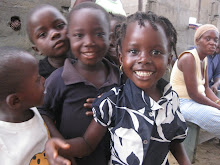Project Brief:
The Malayah Association was founded by Finda Francis, a woman of Bong Mines who wanted to find a way to respond to the destruction and devastation in her community.
The first phase basically centered on “Susu” loans (each week members pay in a certain amount, which is pooled and given to one person to start a small project, such as soap making). The association still does Susu loans, but has also moved in to agriculture, which is an area it hopes to expand in the coming months.
I originally thought it was a women’s group, but it actually pulls in all members of society – old, young, men, women. Rev. Anthony works closely with Ma Finda with the association’s organization. He’s also incredibly nice and welcoming – really fantastic people.
One man told me, “Before the war, we were lazy. We had life very easy. But now, we know we must work. We know we must rely on the land.” And so they are trying, slowly slowly, to establish a livelihood from farming – which is heavily promoted in developing countries, but much easier said than done, especially when considering the fact that it is all dependent on manual labor. It’s truly not easy, deh.
“Malayah” is translated from Kissi to mean “help me,” but it’s really more in the spirit of “self help.” Currently, there are 72 members (50 of whom are actively engaging in the agriculture project). The goal is to increase the skill level of community members so that they can have some sort of livelihood whether or not the mining company ever comes back. They farm rice, plantain, bitter ball, banana, eggplant, pepper, banana, corn, and are looking to add more vegetables to the farm as well. The farms are not centrally located – they were unable to get one large plot of land.
Opportunities:
1. Niapele Project School Feeding Program: Linking with NP to provide produce for the school feeding program will give the Malayah Association a consistent buyer. Presently, Malayah is trying to become a Government Accredited NGO, so that they have some credibility within both Liberia and the international community. Their association with the Niapele Project is not a formal link, rather NP is contracting them to be involved with the school feeding program.
2. Transportation: Bong Mines has access to a train that runs directly to Monrovia three times a week, giving community members the ability to easily and cheaply transport their goods to a larger market.
Challenges:
1. Transportation: While Malayah does have access to the train to Monrovia, getting the produce to the train is in itself an issue. The walk to the farm is about 45 minutes. Furthermore, the road is not good and difficult to access by car. In order to transport the goods back to the town, association members must pay a driver to pick produce up – it’s not cheap and it has an impact on profits. The Association is working to find a plot of land (5-6 acres) so that all the farms can be located in one place.
2. Revival of Mining Industry: There are rumors that the Chinese are coming back to re-open the mines, however I’m not sure when that will be. It’s also an interesting issue – because I wonder how many people will shift from agri back to mining if the company comes back. There are the undeniable benefits the community will feel in terms of commerce and emerging businesses, but there’s also the issue of the environmental implications: what impact will the waste have on the soil? Water? Produce?
3. Funding: Malayah is looking to expand their activities from Susu loans and agriculture to supporting sick members, peacebuilding activities, and working within the community to settle land disputes. The registration as an NGO can cost up to US$300, and there is also the need for tools and transport costs. Obviously, the goal is to be self-sustaining. And hopefully associations like the one with NP will help with that, as will a more targeted marketing approach; however start up costs are necessary and do go a long way when used well. And this group really seemed to have its act together. (They were also rather kind to me :))
More information:
If you’d like more information about the Malayah Association, you can check out Niapele’s project description (http://www.theniapeleproject.org/blog/story-field-women-malaya). When I was getting on the plane to come to Liberia from Ghana, an African woman boarded and saw someone she knew, who asked how her time in America was, “Oh but the money is finished there! It’s all finished!” That said, if you’d like to donate directly to the Malayah project you can contact me :) Or if you’d like to donate to the Niapele Project’s school feeding program, you can do so on their website (it is separate from Malayah but still doing good things!). No worries though, the money is finished in America and it’s not easy deh!
Subscribe to:
Post Comments (Atom)

No comments:
Post a Comment